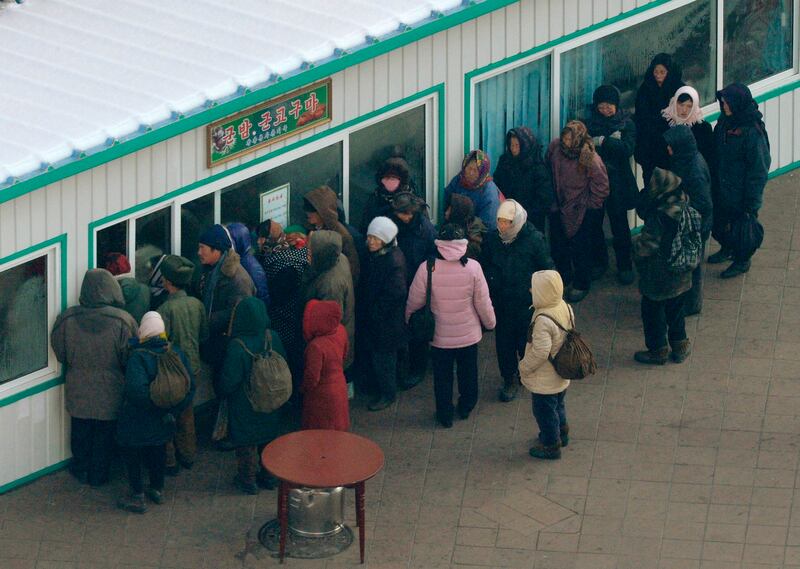A North Korean soldier fell from a tree and broke his arm after authorities mobilized his unit to harvest chestnuts to be sold below cost in Pyongyang to demonstrate leader Kim Jong Un’s love for the privileged citizens of the capital, his father told RFA.
Forcing soldiers and civilians to provide free construction or farm labor is common practice in North Korea, but usually they eat some of the food they grow and use the buildings they construct.
However, units stationed near Pyongyang are being mobilized to collect 30 kg (66 lbs) of chestnuts daily, or roughly 2,500 to 3,000 nuts, and are not allowed to eat even a single chestnut.
Instead the nuts are used for a propaganda scheme in Pyongyang, sold below market value to the capital’s citizens, who are vetted for political reliability and enjoy privileges and a lifestyle unobtainable by rural North Koreans.
Sources said making the underfed soldiers collect food for more privileged citizens was unfair.
“Last week I went to the hospital after receiving a call that my son, who is serving in the military in Songchon county, South Pyongan province, was hospitalized with an arm injury,” a resident of the northeastern province of North Hamgyong told RFA’s Korean Service Monday.
“My son was in a cast with a broken arm. His entire military unit was picking chestnuts to be sent to Pyongyang when he fell from a chestnut tree,” said the soldier’s father, who requested anonymity for security reasons.
According to the soldier’s father, the mobilization orders from the military’s General Staff Department specify that each soldier is responsible for collecting 30 kg of chestnuts daily to be sent to Pyongyang in the name of Kim Jong Un. Other units near Pyongyang were also mobilized, he said.
“When I went on a business trip to Pyongyang, I bought roasted chestnuts from a stand. A bag of roasted chestnuts with their shells still on, weighing about 200 grams, was sold for 2,000 North Korean won (U.S. $0.39) about half the price of the local marketplace.”
“I didn’t feel comfortable knowing that the chestnuts were picked by young soldiers like my son… How hard it must have been for them to climb up and down trees every day to pick 30 kg of chestnuts,” the soldier’s father said.

Soldiers on chestnut detail were often injured from falls in the unit of a former soldier stationed in Pyongyang’s Samsok district, who is now a refugee living in South Korea, he told RFA.
“Until I was discharged in 2016, the whole unit was mobilized to pick chestnuts every autumn. Chestnut trees are weaker than other kinds of trees, so every year there were many soldiers who fell off the trees and got hurt,” said the refugee, who declined to be named.
“There is an orchard that specializes in supplying chestnuts to the Pyongyang vegetable wholesale center, which manages the chestnut stands, but it does not produce enough. So, every fall, military units around Pyongyang are mobilized to supplement the orchard,” the source said.
The mountains near Samsok district are rich with wild chestnut trees, and the former soldier and his unit hiked far from the military base for harvesting, he said.
“Sometimes, our daily task was to stop children from leaving the village to prevent them from going out to get ‘our’ chestnuts. I still feel sorry for them,” the refugee said.
“We picked so many chestnuts every year, but during my 10 years of military service in Pyongyang, I was never able to buy chestnuts from chestnut stand,” he said.
“They are all over TV and in the newspaper saying that the roasted chestnut stands, which can only be found in Pyongyang, are examples of the party’s love for the people. To be honest though, it’s not the party’s love at all, it’s the sweat and sacrifice of so many soldiers.”
Still technically at war with wealthier South Korea, North Korea makes every male serve about eight years in the armed forces according to South Korean intelligence. North Korean refugees in South Korea told RFA that the basic service period for non-technical and non-special forces units was seven years. From 1993 until this year, service time was 10 years.
According to the CIA’s World Factbook there are approximately 1.1 to 1.2 million active troops in the North Korean military, more than about 80 percent of whom serve in the army.
Reported by Chang Gyu Ahn for RFA’s Korean Service. Translated by Leejin Jun. Written in English by Eugene Whong.
